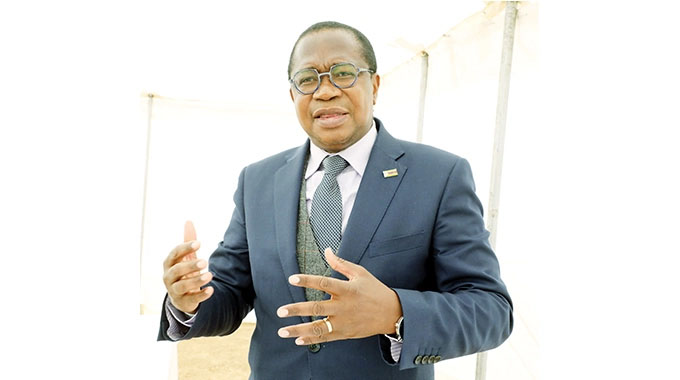Global bodies keen to support Zim health sector

Africa Moyo–Deputy News Editor
A number of global organisations involved in health provision are keen to work with Zimbabwe in a bid to boost the sector, Finance and Economic Development Minister Professor Mthuli Ncube has said.
He said this in an interview following his presentation during a high-level panel discussion at the World Economic Forum in Davos, Switzerland last Friday.
The WEF was held from January 16 to 20, under the theme “Cooperation in a fragmented world”.
It brought together about 2 500 heads of state and government, business CEOs, civil society representatives, media and youth leaders from Africa, Asia, Europe, the Middle East, Latin America and North America to work together to rebuild trust and shape the principles, policies and partnerships needed to meet the challenges of 2023.
The high-level panel discussion was attended by former British Prime Minister Tony Blair and World Health Organisation director general Dr Tedros Ghebreyesus.
Said Prof Ncube: “At WEF Davos, Switzerland, I contributed to a panel discussion chaired by former United Kingdom Prime Minister Sir Tony Blair, on global health issues.
“I gave an account of Zimbabwe’s experience in managing Covid-19, the introduction of an NCD Health Fund for non-communicable diseases, and the challenge of retaining health workers. Overall, there was recognition that health is an investment and not an expense, and African countries should be more self-reliant.”
Prof Ncube said the presentation was “well received and highlighted the potential and hidden capacity of African countries such as Zimbabwe”.
“Most global organisations are willing to work with Zimbabwe in the health sector,” said Prof Ncube.
The Government has continued to support the health sector using internally generated resources, and assistance from development partners.
Following the outbreak of Covid-19 in Zimbabwe in March 2020, the Government immediately marshalled resources and refurbished critical health facilities such as Wilkins Infectious Diseases Hospital, with the help of its all-weather friends.
More internally generated funds of up to US$100 million at the beginning, were then set aside for the acquisition of vaccines.
Other resources were used to set up isolation centres across the country, and health posts at ports of entry and exit.
Notwithstanding financial constraints, the Government is determined to provide quality health services, as evidenced by the ongoing construction and rehabilitation of health facilities across the country.
Notable projects include the Lupane Provincial Hospital, health posts in Mutasa, Mashayamvura, four in Gokwe North; and three in Centenary districts, 30 poly-clinics and five district hospitals under the NMS1 project, among others.
Prof Ncube said Government has also guaranteed the stable supply of life saving drugs for HIV/AIDS, TB and malaria co-morbidities, completion of Harare National Pharmaceutical Warehouse, procured Magnetic Resonance Imaging equipment (MRI), as well as ambulances and service vehicles.
In the $4,5 trillion 2023 National Budget, Prof Ncube set aside 11 percent of total expenditures towards the heath sector, the eventual target being to meet the Abuja Declaration of 15 percent.
Meeting the target is necessary to attain Vision 2030 of becoming an upper middle-income economy as demanded by President Mnangagwa.
The health sector also benefits from development partner support, having received a total of US$408,3 million during the first nine months of 2022. The resources went towards the areas of maternal, new born, child adolescent and reproductive health, HIV/AIDS, TB and Malaria prevention programmes, and strengthening of the health delivery systems.
This year, the health sector is projected to receive US$212,9 million from the development partners towards the same areas.
With the health sector facing challenges related to high staff turnover, resulting in an overall vacancy rate of 13 percent and more pronounced among the specialist doctors’ categories.
Such a high turnover of health personnel is compromising the provision of health services in the public sector.
But Prof Ncube said Government was addressing this challenge through continuous review of both monetary and non-monetary incentives to attract and retain medical personnel.
Health specific allowances have generally been indexed to the US dollar, to address the impact of inflationary pressures.
On non-monetary benefits, Government has set aside resources towards the construction of institutional accommodation at various health centres, including procurement of staff buses and operational vehicles.
Further, the Government and banks are working on a Vehicle Guarantee Fund, to ensure sustainability and wider access to vehicle loans at concessionary terms for health workers.
Government has also approved a housing guarantee fund to enable health workers easier access to affordable loans from banks. Since inception, 637 staff members have benefited from the scheme.
In addition, members are benefiting from the vehicle duty-free dispensation to import personal vehicles using free funds.
As of late November last year, over 1 000 health workers had benefited from the scheme.











Comments